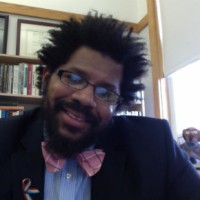The Christian campus and sexual identity
Historically, black people and those deemed “homosexual” have been marginalized and silenced on many faith-based campuses. My post here in December notes the increasing acceptance of black Christians at Christian schools. However, such acceptance has not been extended to LGBTQ Christians.
W.E.B. Du Bois’s The Souls of Black Folk intertwines “the problem of the twentieth century” color line with LGBTQ resistance in the 21st century. The structures of resistance toward racial equality are also paradigmatic of gender and sexual inequality. Both racial and LGBTQ liberation struggles began with Brown v. Board of Education.
However, there have long been mixed thoughts regarding racial equality and sexual equality. Even Du Bois was bothered by LGBTQ folk. As historian Michael Bronski noted in A Queer History of the United States, Du Bois, the champion of civil rights, was critical of the LGBTQ community, leading to his dismissal of Augustus Granville Dill from The Crisis magazine. Christians, on the other hand, have demonized LGBTQ people by referencing scripture as evidence of their sin. Black evangelicals have been just as critical, if not more critical, of the LGBTQ community. By the late 1970s, religious scholars described America’s Fourth Great Awakening as the coalescing of religious and political conservatives fearing LGBTQ activists’ demands.
After the 70s, Christian organizations mobilized against what they perceived as the LGBTQ agenda. A number of Christian schools added to their standard of conduct a moral clause specifically prohibiting LGBTQ behavior for both students and teachers. In recent years, however, students have responded to campus expulsions and an overall environment that leaves them feeling dehumanized.
During the spring term of 2011, Harding University students gained national attention as they vehemently protested their university’s stance on homosexuality. Those who felt victimized by the campus’s leadership took to the Internet as they launched the Zine at the site HU Queer Press. Here students shared their frustrations, pointing to a Christian school that persecutes LGBTQ students for their sexuality.
Harding student Shaun Melady broke his silence by writing “I’m a Gay Guy at a Christian College” for Advocate magazine. Melady expressed his perspective of feeling marginalized, in an aim to inform heterosexual Christians of the persecution LGBTQ Christians face. His focus centered on building a community of allies and self-expression:
I am fed up with the worry, angst, and fear about what other “Christians” are going to think. I am sick of the judgmental glares that come my way when I walk through the halls. I am tired of thinking in a worrisome manner about what the next words should be that come out of my mouth because I don’t want the “people of God” to think that I am some kind of grotesque being.
Melady and the students of HU Queer Press represent a growing number of marginalized LGBTQ evangelicals who are speaking out.
“Hope for the Gay Undergrad,” an article published by Christianity Today, noted that Christian school leaders are reevaluating their position toward gay students. Still, according to this article, students attending Christian schools reported that they would be terrified of campus leadership were they to come out. In many cases such terror is warranted, as exemplified recently at Harding. On March 3, 2011, the now retired Harding president David Burks responded to HU Queer Press in chapel, announcing that the university had firewalled the group’s website. This action not only furthered a sense of fear on campus but also functioned as anti-intellectual censorship, although Burks claimed that was not the aim. Further, Burks labeled the title ‘queer’ as offensive and repulsive—a statement that demonstrates his ignorance of LGBTQ discourse. In addition, Burks cited the student handbook to argue for the immorality of LGBTQ lifestyles.
Some LGBTQ students and allies continue their activism off campus following graduation, as they seek to support current LGBTQ Christian students. Cedarville Out is comprised of current and former students of the conservative Christian Cedarville University in Ohio. The group’s mission is to integrate faith and sexuality. Though Cedarville University has no official ties to the alumni group, they have engaged in discussions as both sides seek to promote a civil dialogue regarding sexuality.
The reality facing conservative institutions is a backlash from millennials. As this Atlantic article notes, the future looks grim for Christian institutions that do not support LGBTQ students.
Our weekly feature Then and Now harnesses the expertise of American religious historians who care about the cities of God and the cities of humans. It's published in partnership with the Kripke Center of Creighton University and edited by Edward Carson, Beth Shalom Hessel, and John D. Wilsey.





